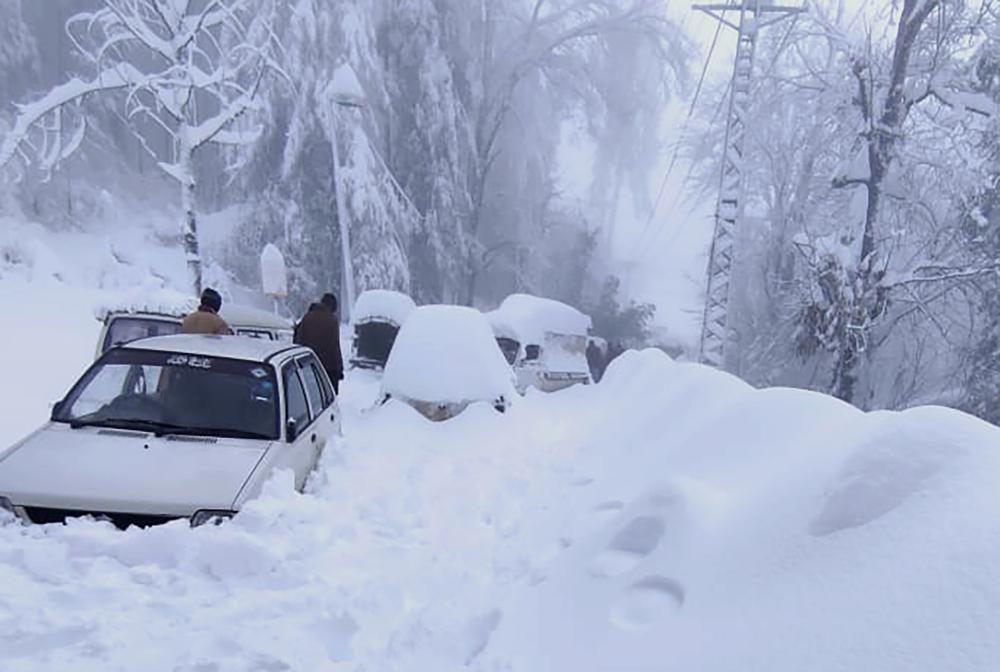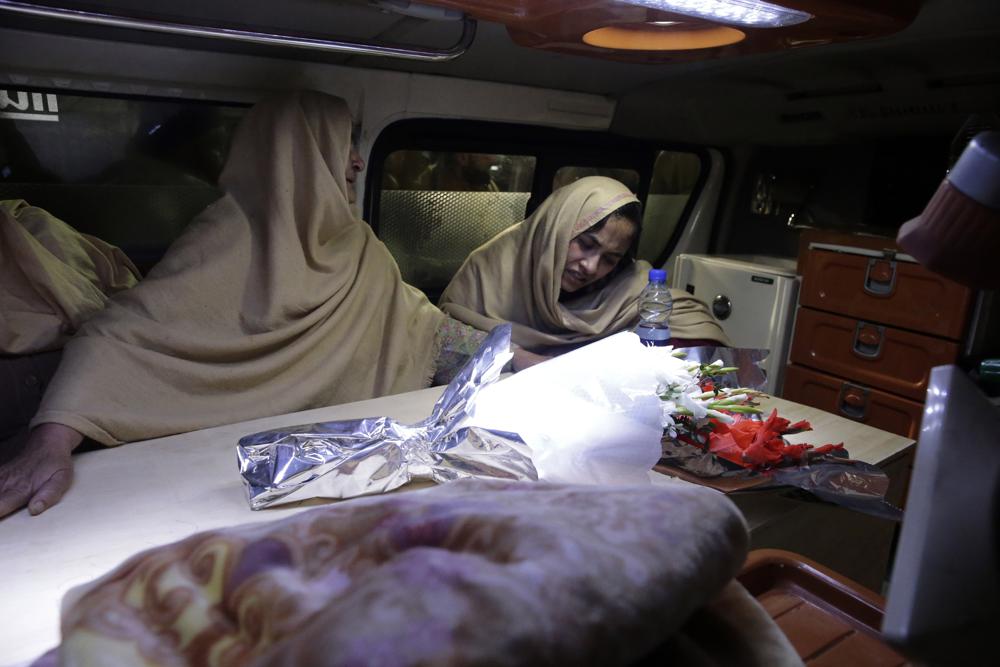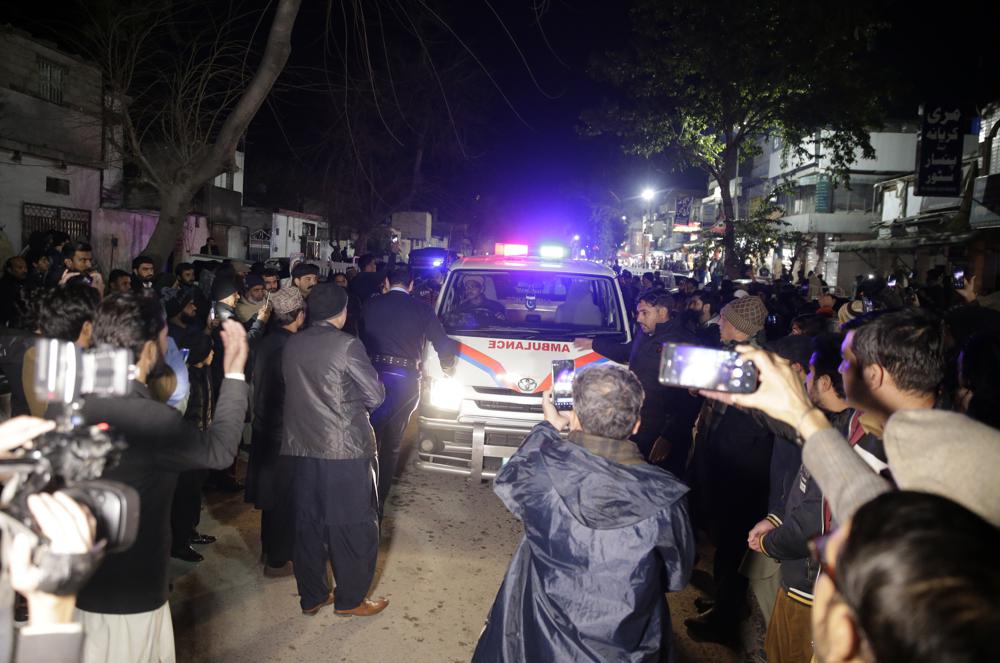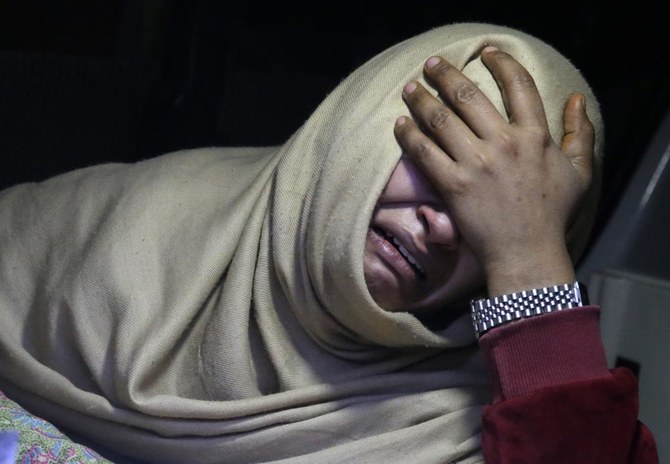ISLAMABAD: It was on the evening of January 7 that a holiday to the Pakistani mountainside town of Murree to view the winter snowfall turned into a nightmare for Muhammad Bilal.
Bilal, 21, was among tens of thousands of visitors that thronged to Murree this weekend to see unusually heavy snowfall and ended up stuck in a major traffic jam on snow-clogged roads on Friday evening.
At around 4pm, Bilal, who hails from Mardan in Pakistan’s Khyber Pakhtunkhwa province, called his family and said the group, which comprised Bilal, two relatives and a friend, were returning home because of the unmanageable snowfall. During another call at 9pm, Bilal told his family the group’s car was now stuck in a traffic jam.
“His last words were that they will reach back as soon as the road opened,” Muhammad Ghafoor, Bilal’s father, told Arab News via phone from his hometown of Katlang.

In this photo provided by the Inter Services Public Relations, people walk past vehicles trapped in a heavy snowfall-hit area in Murree, some 28 miles (45 kilometers) north of the capital of Islamabad, Pakistan, Saturday, Jan. 8, 2022. (AP)
On Saturday morning, when Bilal’s mother called his cellphone to get an update on his whereabouts, a stranger picked up and told her that her son had been found dead in his car.
Bilal is among at least 22 people who died in Murree in freezing temperatures on the night between Friday and Saturday. Police say some of the victims froze to death in their cars, while others died from asphyxiation after inhaling exhaust fumes in snow-bound vehicles.
“This was so shocking and unbelievable that she [mother] almost fainted,” Ghafoor said. “Then we called on the numbers of the other persons who were with Bilal on the trip and got the same reply from another person .. they discovered their bodies after opening their car doors as they were not responding after multiple knocking on the windows.”
The Pakistan Meteorological Department (PMD) had predicted heavy snowfall in Murree and the Galiyat mountainous regions from January 6 to 9. But despite appeals by authorities to postpone travel plans due to bad weather and roadblocks, tens of thousands of snow-tourists arrived in Murree, 64 km (40 miles) northeast of the capital Islamabad, in the past two days.

Women cry inside an ambulance after they lost their family members during a heavy snowfall-hit area in Murree, some 28 miles (45 kilometers) north of the capital of Islamabad, Pakistan, Saturday, Jan. 8, 2022. (AP)
The resort town built by the British in the 19th century as a sanatorium for colonial troops clutches the sides of steep hills and its narrow roads are jammed even in good weather. Critics of the government say local authorities were ill-equipped to handle the annual influx of snow-tourists but did not prepare to deal with an emergency amid unusually heavy snowfall. They say even though authorities warned last weekend that too many vehicles were trying to enter Murree, they failed to discourage hordes of day trippers from going up the mountain from the capital.
It was only on Saturday, after the first reports emerged that people may have died, that the administration jolted into action to clear roads and begin rescue work. The army and paramilitary troops were also then called in to assist. An operation to clear roads and rescue stranded people was ongoing on Sunday afternoon.
In a tweet on Saturday, Prime Minister Imran Khan, who has personally promoted tourism to Murree and its surrounding areas, appeared to be blaming the tourists for negligence.
“Unprecedented snowfall & rush of ppl proceeding without checking weather conditions caught district admin unprepared,” Khan said on Twitter.
Ghafoor blamed the government.

Ambulance carry the dead body of victim after they lost their life after a heavy snowfall-hit area in Murree, some 28 miles (45 kilometers) north of the capital of Islamabad, Pakistan, Saturday, Jan. 8, 2022. (AP)
“We accept it as will of Allah,” he said of his son’s death. “But the government should have warned the tourists about severe weather conditions and closed the entry to the hill station to avoid the traffic congestion.”
Zahoor Ahmed, whose cousin was married to another victim, Sohail Ahmed, echoed the sentiment.
“We are not putting blame on anyone but timely response could have saved many lives,” he told Arab News.
Like Bilal’s family, the Ahmeds too found out about Sohail’s passing because a stranger picked up his cellphone and informed them that he had been found dead with three others in a car.
Local journalist Tayyab Gondol also traveled to Murree by public transport on Friday to enjoy the snow and said he survived and made it back only because he got off the bus and trundled through the snow on foot.
“We were on public transport,” he told Arab News. “We were lucky that we were not having our own car, otherwise could have met the same fate.”
His cousin Naveed Iqbal, a police officer from Islamabad, however, was not so lucky. Iqbal died in his car with seven others — three daughters, a son and his sister, niece and nephew.
When the nightmare struck on Friday evening, Iqbal called Gondol and asked for help, saying his car was stuck amid continuing snowfall.
“After talking to Iqbal, I called every responsible official CTO (chief traffic officer), Murree police officers, local administration and other high officials in Rawalpindi but no one responded with concrete actions,” Gondal said, adding that he kept sharing the live location of Iqbal with various officials but most responded that they were aware of the situation and promised that the roads would be clear “very soon.”
“I received his last message at 4am on Saturday in which he said they were still stuck on the same spot without any help,” Gondol said.
He lamented that the government had only spring into action once news of the crisis went viral on social media.
“The administration should have issued a red alert about the weather and snow and stopped vehicles at the toll plaza,” He added. “That could have saved many precious lives.”
















